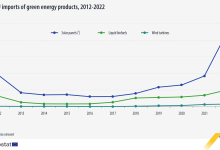Did Romania Grow any CEO in the Last 30 years?
Iulian Harpa is Managing Partner of HiM Public Affairs, a consulting firm operating mainly in the energy secto
My story
It was at the end of 2010 when I accepted the offer to work at Cameron US, in Houston/Texas, which involved business commitments on all continents.
Officially, at that time, I was working at the largest oil & gas company in South-East Europe, implicitly at the largest company in Romania, in a department that is positioned as an elitist one within that company. You can imagine, of course, that my dose of modesty was very small, which made me initially refuse to go to the interview, which later turned out to change my entire career.
In fact, it was exactly 10 years since I worked for OMV Petrom and where I barely managed to penetrate the seniority level in the Internal Audit department.
After the major shock felt, following a professional change from a SE European culture to an American one:
- I managed a double workload, with at least monthly trips all over the world (including the dreaded SOX audits with Big4 auditors from New York), with a team 5 times smaller in number! Thus, I learned what EFFICIENCY actually means!
- I was chosen in 3 quarters of 2011 as the best member of the team. Why? I had heard for the first time, a completely new word for me: GREAT!
- I understood that there is no daily allowance for traveling and then, with difficulty, I managed to relax and correctly understand the calls of the Director from Houston, who recommended the best restaurants in the cities where I was traveling for work (e.g., Milan, New Orleans, Houston, London, Leeds, Doha, Montpellier, etc.). The business card, beyond any benefit, implies RESPONSIBILITY
- I worked almost permanently with time zone differences of about 8 hours and to continue to deliver and to respect deadlines assumed. This was possible because the management assigned me something that we really need, TRUST.
What did I learn from this experience?
- That not all of us perform in any team or system. Smiling, I think of examples from sports: Maradona or Hagi could never perform in an ultra-organized system and applied to every Barcelona player!
- And never, but never give up trusting yourself!
- Certifications and international experience help you to develop enormously: interculturally, professionally, and last but not least, as a human being.
Short intro about CEO concept!
Today more than ever, we are relying on our leaders to deliver. We’re asking more of them than we have in decades. However, beyond the high demands on business performance, leaders are feeling the weight of climate targets, digitization, geopolitical risk, employee demands, and diversity, equity, and inclusion goals.
For instance, international researchers into leadership success (e.g., BCG), observe a long-term trend, now sped up, that calls on leaders to shift away from an extractive style (shot term results) and toward a generative approach, with a focus on building the capacity of the organization to rapidly adapt, live its purpose, and grow.
In real business the CEOs are leading with the head (reimagining company’s products but also leading the way across organizations to reinvent industries), with the heart (inspire and enrich the human experience by building great cultures and workplaces where people can do their best work) and with the hands (high-functioning, empowered, and cross-functional supercharged teams that execute and innovate with agility).
Dorin Badea talks in his latest book “The inconvenient truth from the top of organizations” about a concept or rather an equivalent of the Romanian saying “the fence is painted outside, and the leopard is inside” in which he directly and transparently mentions incompetence and mediocrity at the level C of companies.
The real reason why managers fail is not related to exogenous factors, the quality of people, the competition, or the salary level. The failure is due – as Chris Anderson well said in the Ted Talks guide – to the lack of a red thread that should refer to ideals, the motivation to come to work and not the existence of selfish and narcissistic leaders who perpetuate themselves in the absence of organizational culture!
From the rule of good practice, the author goes even further and recommends a legislative framework that obliges top managers to take courses for professional development in order to avoid the situation in which “it is not possible that a quarter of executives have the traits of psychopaths”. In Jonathan Pearlman’s article published on September 13, 2016, in “The Telegraph”, he referred to the Australian study, carried out in the USA, based on which it was found that one in 5 American executives is a psychopath. Statistically, out of 2000 analysed companies, only 10% of the executives are modest and competent, who build leaders, a sustainable organizational culture, which adds value to the business and local communities.
International benchmarking
A relevant example of putting generative leadership in practice is Francesco Starace, CEO of Italian utility Enel. To move the company into renewable energy, he encouraged the team to spend 20% of their time on innovative projects, introduced a “my best failure” initiative to promote creativity/risk taking, and launched a crowdsourcing platform that allows outsiders to propose solutions to innovation challenges. Six years after, Enel became the world’s largest supplier of renewable energy—and increased its market value by 2.6 times.
Satya Nadella, the CEO of Microsoft, set out to transform the company’s adversarial culture into an environment focused on a growth mindset, collaboration, an obsession with the customer, and moving from a culture of “know-it-alls” to one of “learn-it-alls”.
Take Ikea’s leadership team, for example with a long history of steady and profitable business. In 2011, when they decided to fundamentally change their company’s relationship with the environment and society, they took immediate and concrete measures. The company started to carefully measure and report on its carbon emissions and those of its thousands of suppliers, and it rolled out stringent ethical and sustainable sourcing policies. Once Ikea’s leaders had a better view of the company’s entire supply chain, they set goals to keep improving over time.
As Francine Katsoudas, Cisco’s executive vice president and chief people, policy, and purpose officer, said that “We care about our people even on the weekends.” Consistent with this 24/7 caring philosophy, she alerted her leadership team to managers’ need for more support early in the pandemic, leading Cisco to significantly expand access to mental-health resources. In that light, Cisco was named the best company to work for by Fortune in 2021.
Best Buy has likewise done an exceptionally good job on the heart dimension of leadership. Under former CEO Hubert Joly, the company undertook a successful turnaround that emphasized the employee experience, while its stock generated annual returns of around 20%. Unfortunately, for profitability purpose, short-term managers use to say that: “You better cut, cut, cut, close stores, fire a lot of people,” Joly told Harvard Business Review in 2021.
Early in 2020, Pfizer began a company-wide push to produce a vaccine against COVID-19. Critically, it formed a supercharged team with Germany’s BioNTech, a specialist in the development of mRNA vaccines, and a network of academic experts. Michael Dolsten, Pfizer’s chief scientific officer and president of its worldwide R&D, share that employees were galvanized to solve this pressing global problem. Everyone felt that an individual person could make a big contribution to the team effort. The sense of shared purpose broke down silos. Pfizer became “an unstoppable team”.
Romania benchmarking: CEO or exclusive COO
Why in Romania CEOs do not do business development? Because the objectives and the strategy to achieve them are established elsewhere! And they (CEOs) are in fact exclusively COOs who must execute and deliver operational tasks. Full dot!
We all know that a real CEO will never accept staff reductions because this is the first proof of managerial incompetence for this level. Or you can only accept it if we admit what I wrote above in the case of selfish-narcissistic managers with a temporary mandate, with the only goal for a better state and salary.
It is interesting that mediocrity can be defined in a different way than in the classical way. In the case of C-level managers, it can be translated as “you assume that the plan goes well, to growth business, to reach your proposed objectives, possibly the volume of sales… and you to think that you are great”.
Mediocre and incompetent managers are like that because they choose this deliberately and, unfortunately, most of them make the choice very consciously. Why? Because if you dare to go beyond the pragmatism of figures, related to short-term profitability, you risk entering the league of strange idealists! But isn’t the progress itself, the organizational culture, based on ideals, on values and principles, on innovative leaders that generate development?
Many companies (Tesla, Microsoft, GE, etc.) have given up annual evaluations because evaluation systems allow narcissists and those with good communication to obtain maximum evaluations and implicitly, successive promotions!
Any CEO in Romania?
Romania has always been proud of excellent results in all subjects and in all sectors. In this period, when things are perhaps more unclear than ever, I like to think that we are at a turning point, whether we are talking about education, sports, culture, or business education.
As far as the business area is concerned, in Romania, we have to admit that we do not have an entrepreneurial tradition or the management of some corporations and, consequently, it is natural to calibrate our expectations accordingly.
We also have a successful first generation! The one of the 2000s when the lack of a business tradition brought to the children of managers from the state system who, very quickly, identified the opportunities to collaborate with foreign investors. They have well combined the strategic positions of their parents with what they have learned at the international schools and, without diminishing their contribution, they have ensured a first coherent dialogue between the authorities/regulators with the investors.
Returning to the present, Romanian corporations still cannot afford the risk of recruiting young entrepreneurs because the strategy is elsewhere! For short-term results, there is no need for young innovators, with an attitude aimed at business development based on a sustainable organizational culture!
On the other hand, in business, it is universally recognized that selfish and narcissistic managers consciously develop a very strong self-image precisely to compensate, from a psychological perspective, a huge void they have inside!
What do we have instead in Romania? Beyond 6-weeks online courses that promise to immediately make you a successful CEO and business education, made at the morning joke shows, I have also identified other “opportunities” and local good practices:
- Micro-enterprises, having only 4-5 employees, whose managers call themselves CEOs. Can you imagine what organizational culture and what company can develop such leaders?
- CEOs who are in fact Executive Directors (COOs) and who permanently confuse – for the short period of their mandate – their professional competences with the brand of the company they represent.
- Former sales executives who are ideals for short-term results. They accept the superior position of CEO and, implicitly, the strategies of others to which they never had any contribution.
- To refer to the management of state companies…probably I need more competence and business education to understand it!
And, to end on a positive note, I admit that I had the chance to meet several foreign shareholders and investors in Romania who, without exception, spoke highly positive related to the effectiveness and professionalism of the Romanian middle-management. They liked them, they hired them and, in order to motivate them, they blessed them and, you already anticipated how, … CEO!







